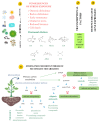The Good, the Bad, and the Epigenetic: Stress-Induced Metabolite Regulation and Transgenerational Effects
- PMID: 40265377
- PMCID: PMC12015926
- DOI: 10.3390/epigenomes9020010
The Good, the Bad, and the Epigenetic: Stress-Induced Metabolite Regulation and Transgenerational Effects
Abstract
Background: Plants face a wide range of environmental stresses that disrupt growth and productivity. To survive and adapt, they undergo complex metabolic reprogramming by redirecting carbon and nitrogen fluxes toward the biosynthesis of protective secondary metabolites such as phenylpropanoids, flavonoids, and lignin. Recent research has revealed that these stress-induced metabolic processes are tightly regulated by epigenetic mechanisms, including DNA methylation, histone modifications, chromatin remodeling, and non-coding RNAs.
Methods: This review synthesizes current findings from studies on both model and crop plants, examining the roles of key epigenetic regulators in controlling secondary metabolism under stress. Special focus is placed on dynamic changes in DNA methylation, histone acetylation, and the action of small RNAs such as siRNAs and miRNAs in transcriptional and post-transcriptional regulation.
Results: Evidence indicates that stress triggers rapid and reversible epigenetic modifications that modulate gene expression linked to secondary metabolic pathways. These modifications not only facilitate immediate metabolic responses but can also contribute to stress memory. In some cases, this memory is retained and transmitted to the next generation, influencing progeny stress responses. However, critical knowledge gaps remain, particularly concerning the temporal dynamics, tissue specificity, and long-term stability of these epigenetic marks in crops.
Conclusions: Understanding how epigenetic regulation governs secondary metabolite production offers promising avenues to enhance crop resilience and productivity in the context of climate change. Future research should prioritize dissecting the stability and heritability of these modifications to support the development of epigenetically informed breeding strategies.
Keywords: DNA methylation; epigenetic regulation; histone modifications; non-coding RNAs; phenylpropanoids; secondary metabolites; stress memory.
Conflict of interest statement
The authors declare no conflicts of interest.
Figures
Similar articles
-
Epigenomics in stress tolerance of plants under the climate change.Mol Biol Rep. 2023 Jul;50(7):6201-6216. doi: 10.1007/s11033-023-08539-6. Epub 2023 Jun 9. Mol Biol Rep. 2023. PMID: 37294468 Review.
-
A review of the potential involvement of small RNAs in transgenerational abiotic stress memory in plants.Funct Integr Genomics. 2024 Apr 11;24(2):74. doi: 10.1007/s10142-024-01354-7. Funct Integr Genomics. 2024. PMID: 38600306 Review.
-
Epigenetics: possible applications in climate-smart crop breeding.J Exp Bot. 2020 Aug 17;71(17):5223-5236. doi: 10.1093/jxb/eraa188. J Exp Bot. 2020. PMID: 32279074 Free PMC article. Review.
-
Mechanisms of Plant Epigenetic Regulation in Response to Plant Stress: Recent Discoveries and Implications.Plants (Basel). 2024 Jan 7;13(2):163. doi: 10.3390/plants13020163. Plants (Basel). 2024. PMID: 38256717 Free PMC article. Review.
-
Multifaceted Chromatin Structure and Transcription Changes in Plant Stress Response.Int J Mol Sci. 2021 Feb 18;22(4):2013. doi: 10.3390/ijms22042013. Int J Mol Sci. 2021. PMID: 33670556 Free PMC article. Review.
Cited by
-
Cortisol-Induced Chromatin Remodeling and Gene Expression in Skeletal Muscle of Rainbow Trout: Integrative ATAC-Seq and RNA-Seq Analysis.Int J Mol Sci. 2025 Jun 25;26(13):6079. doi: 10.3390/ijms26136079. Int J Mol Sci. 2025. PMID: 40649857 Free PMC article.
-
RNA signaling in medicinal plants: An overlooked mechanism for phytochemical regulation.Biochem Biophys Rep. 2025 Apr 29;42:102032. doi: 10.1016/j.bbrep.2025.102032. eCollection 2025 Jun. Biochem Biophys Rep. 2025. PMID: 40342531 Free PMC article. Review.
-
Transgenerational Memory of Phenotypic Traits in Plants: Epigenetic Regulation of Growth, Hormonal Balance, and Stress Adaptation.Curr Issues Mol Biol. 2025 May 29;47(6):404. doi: 10.3390/cimb47060404. Curr Issues Mol Biol. 2025. PMID: 40699803 Free PMC article. Review.
References
-
- Atkinson N.J., Urwin P.E. The interaction of plant biotic and abiotic stresses: From genes to the field. J. Exp. Bot. 2012;63:3523–3543. - PubMed
-
- Divekar P.A., Narayana S., Divekar B.A., Kumar R., Gadratagi B.G., Ray A., Singh A.K., Rani V., Singh V., Singh A.K., et al. Plant secondary metabolites as defense tools against herbivores for sustainable crop protection. Int. J. Mol. Sci. 2022;23:2690. doi: 10.3390/ijms23052690. - DOI - PMC - PubMed
-
- Willis K.J., editor. State of the World’s Plants. Royal Botanic Gardens; London, UK: 2017. Report. - PubMed
Publication types
Grants and funding
LinkOut - more resources
Full Text Sources
Research Materials




